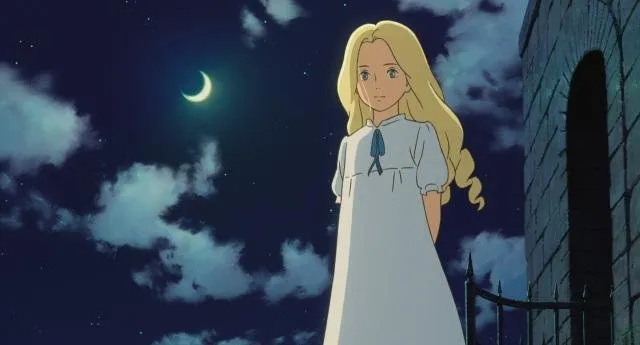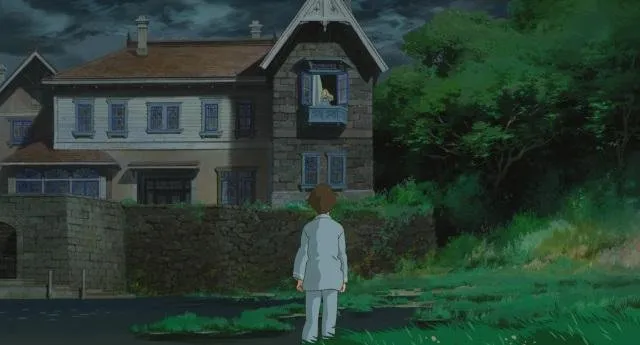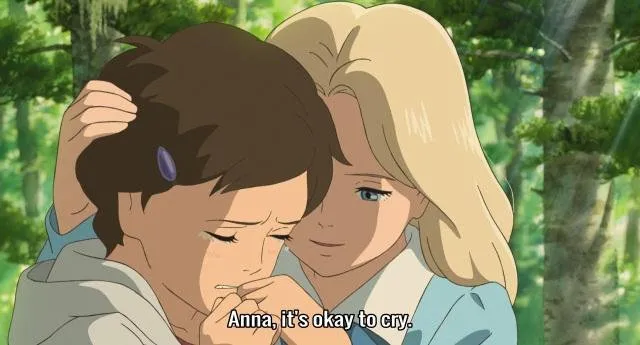Before I begin my thematic discussion and analysis of the film, because this write-up will contain numerous spoilers, I'll cut to the chase and say that this film is my 2nd favourite Studio Ghibli film from the last two decades, and I highly recommend it to anyone and everyone. The film is directed by Yonebayashi Hiromasa who directed The Secret World of Arrietty and is based on a novel by the same name by Joan G. Robinson, first published in 1967, which is set in England.
While it might not seem so at first glance, I hold that When Marnie Was There is a film about growing up. Growing up is also growing past, and beyond this film being about Anna's journey of growing past her own pains, it is also a film about us growing to leave Studio Ghibli, or at least Studio Ghibli as it is in Miyazaki's films (as Takahata's are different in style), behind. And in order to do so, the film that seems much less about the "magical journey", is anything but.
(This is a Things I Like post, it’s not a review, but more a discussion of the show and of ideas that rose in my mind as a result of watching the show. There will be massive spoilers for the film.)
When we first behold Marnie, it is through a dream-scape, far and unknown. When we first meet Marnie, she is clad in blue and white, and welcomes us past a gate. When we last meet Marnie, she is again clad in blue and white. A blonde girl clad in blue and white, to a western audience, should bring to mind Disney's Alice. Marnie invites Anna in, and asks her to keep her a secret. This is an invitation to the unknown and magical world, which in particular is similar both to Alice going down the rabbit hole, and to characters such as Spirited Away's Chihiro and others in Ghibli films starting their journey, but on a more meta-level, it is us being invited on a journey to a place that is just out of touch with reality whenever we watch a Studio Ghibli film, it is an invitation to the land of the fantastical.

There are more references and touches of the fantastical in the film, such when Anna dances amidst the fae until she drops unconscious, or when they go into the "underworld", the lonely silo at the top of the hill, and "fantastical" is very much the key word here, as when the show tells us the truth about Marnie, it still doesn't answer whether we've met her ghost, or whether Anna had been hallucinating the whole thing. "Memories of Marnie," the Japanese name for the film is appropriate here, but not as an answer, because what are ghosts in western myth if not memories of those who are held from moving on?
And here it is where we get to the theme of the movie, as I see it, and of this piece. Marnie's last question to Anna was whether she forgives her for leaving her behind, and one of Anna's most heartfelt messages early on in the movie was how she could not forgive her family for dying and abandoning her. Whether it is Marnie who's always watched over Anna and who couldn't move on until being forgiven or Anna who had to call back the memory of her grandmother, even if she wasn't yet fully aware of the fact, so she could come to terms with her leaving her is a big question, which isn't answered in the film but rather is left for interpretation, but the key point remains - Anna ended up forgiving Marnie for leaving her; she forgave her grandmother for leaving her behind.
Growing up is growing past, and in Anna's case, it's growing past her hurt and feeling of betrayal. Anna is able to forgive Marnie because she loves her so much that she cannot see herself as not forgiving her, as hurting her by not forgiving her, and because she also knows that Marnie loves her, and that she probably had no other option when death called. Anna is not an adult, not a grown up, she's twelve. But forgiving Marnie is what gives her a chance of ever growing up, of getting on with her life. It is what allows her to also forgive her adoptive mother, whom she loves, and knows loves her. It is an acceptance of how things are not always perfect.

While "growing past" sounds very cold, as if it's exactly the sort of abandonment that Anna resents, it is the opposite in this case. Anna had never been left by Marnie, as can be seen by the presence of the memory-ghost, and rather kept her within her. "Growing past" here should mean that one can move on while still keeping your memories within you, as making them a part of you that you accept, rather than resent, and use to remain anchored from any change. Anna carries Marnie within her during the film, and even moreso once the film ends, with her promise to return to Sayako, Hisako, and the Marsh House.
Likewise with us (or at least myself) and Studio Ghibli, and also Disney films, and other elements one attaches to one's "childhood". It's easy to feel some sort of resentment, or at least sadness, when those symbols of our childhood abandon us (such as by an author's death or when a studio will no longer produce films), or when we feel as if they've betrayed us (when we do not like their latest creation), or even the betrayal and loss we feel when we grow past them, when we look back on our old memories and feel as if they were unearned. But just as Anna carried Marnie with her up to now, and just as she will keep carrying her within her now as she finally allows herself to connect to new people, so will Studio Ghibli remain with us, as all the other elements of our childhood that helped shape us to who we are, and still provide bittersweet memories as we look back, and look forward.
When Marnie Was There could just as well have been named "When Marnie Is There", because while to "grow up" is also to "grow past", it does not mean we leave these things behind, but take them with us as we head beyond the point where they could carry us. When Marnie Was There is very much a Studio Ghibli film in its themes and atmosphere of the fantastical, of the emotional journey of young people, and it is also a very fitting farewell to Studio Ghibli, as it teaches us to say farewell fondly, as we can also revisit our past memories. These films will remain there for us, for as long as we need them.
Watch this film, it's a good film, it's a good memory. 9/10.

I really wanted to include this section, but there was just no way to include it organically. So, I'm going to include it past an artificial break, and though it chaffs, I feel so strongly about this film that I cannot do without adding this final flailing moment. This movie towards its end has an "Up Moment", but of course with the moment coming towards the end it can't truly be an "Up Moment," seeing as while it does have a hammering of "Sad Feels", it works because of how the entire movie builds up to it.
When I first watched the movie, ever since we first met Marnie, and perhaps even slightly before, I felt there was "imminent loss" hanging all over the film. Aside from the sense of the fantastical seeping in, I kept feeling a tingling behind my eyes, even when things didn't go badly, there was always the sense of Anna's hurt, of the film holding its breath in as it waits for the other shoe to drop. That "Up Moment" worked not because of its universality and raw sadness, but because the entire film was gearing up to it. This is a film about loss, about terrible loss, and about growing up to accept it, with love. Growing up to accept the love that others have for us, even as we feel unworthy of it.
Beyond being a fantastical film (pun intended), even in its brightest moments, it's a quietly sad film, that doesn't openly declare its sadness, until that final cathartic moment that finally allows us to wake up, and grow up.

Check out my latest posts:
- Steemitschool Poetry Class - Recording and Notes- Critique Thursday - 22/3/18
- Six Bullets to Love - A poem, or several.
- Legends Of... - Mythic parables in the form of poetic prose.

Art and flair courtesy of @PegasusPhysics
This post has originally been posted on my blog here, and has been reformatted and updated as needed for Steemit. You can verify I am the blog owner by scrolling to the bottom of the right sidebar.
All images used in this post are either promotional material from the movie Omoide no Marnie / When Marnie Was There, or are used as part of fair use.
© Guy Shalev 2015.